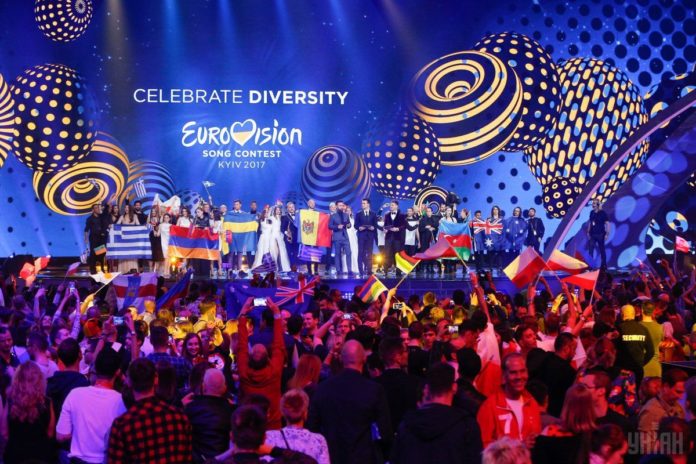In 2017, the Ukrainian capital hosted the Eurovision for the second time. The main diff erence between the Kyiv Eurovision-2004 and the Kyiv Eurovision-2017 was that the “second” pan-European pop song celebration was held in completely diff erent Ukraine, completely unlike Ukraine-2004.
In 2017, our state has actually turned out to be under such conditions which would look like an unlikely anti-utopia scenario in 2004 – these include factual (even if hybrid) war with Putin’s Russia, the occupation of almost eight percent of Ukrainian territory and the fi nancial and economic (even if partly overcome) crisis, the depreciation of the national currency and the potential threat of terrorist acts in all major cities of our country (from Kharkiv to Odessa).

Special tension was added by the fact that Ukraine was represented by the singer Jamala (Susanna Jamaladdinova), an ethnic Crimean Tartar, who won at more than fi erce struggle with a representative of the Russian Federation at the Eurovision-2016 in the Swedish capital.
The victory of Jamala’s was considered controversial and not completely fair not only by the representatives of the Russian Federation, but some representatives of the European bureaucracy, mainly alleging as their reason that the song of Jamala’s “1944” about the tragedy of the Crimean Tatar people is not a format allowable to the Eurovision, and currently one can only guess what money this Russian “euro-solidarity” cost to the Russians on the background of further oil price-cutting.

As Russia went second, any failure in organizing of a song contest in Kyiv hills would automatically mean its holding on the banks of Moscow-River, and therefore the information campaign against the Kyiv Eurovision-2017 version was super-powerful not only in Russia but also in Ukraine, where the speaker of Kremlin were the television channels and the Internet edition of pro-Kremlin political and economic lobby.
The main directions of the informational attack against the Ukrainian Eurovision were the following rather irritating and unfavourable factors – like in a country where the war is going on holding a song contest is dangerous, there is terrible corruption in the country and the funds at the Eurovision will be simply stolen and Kyiv infrastructure is not adapted for such large-scale events.
We should note that the Ukrainian party gave a worthy rebuff in all directions – the security measures were truly unprecedented, the money for Eurovision was found, the Kyiv district, where the contest was held, was upgraded and glammed up without any special haste, and the corresponding place for the competition was found surprisingly timely and appropriately.

Against this backdrop, not only Moscow, but also Kyiv outcries on the tip of Moscow about a very long repair of the metro station “Livoberezhna” (the nearest station to the venue of the competition) and that the traffi c jams on the main highways tormented the ordinary people of Kyiv and tormented as a matter of fact because of the Eurovision, were perceived as evidence-free accusations of Moska against the Elephant from the famous fable.
 Markiyan Lubkivskyi, a high-level Ukrainian offi cial, former Extraordinary and Plenipotentiary Ambassador of Ukraine to Croatia in 2006-2009, and the director of the “Euro-2012” European Football Championship of superiority, which was held in Ukraine, however, not without skepticism, notes:
Markiyan Lubkivskyi, a high-level Ukrainian offi cial, former Extraordinary and Plenipotentiary Ambassador of Ukraine to Croatia in 2006-2009, and the director of the “Euro-2012” European Football Championship of superiority, which was held in Ukraine, however, not without skepticism, notes:
– Eurovision-2017 and the football superiority of Europe-2012 are not proportional to a scale… The football championship required much more expenses… at that time UEFA provided Ukraine and Poland with 500 million euros… As for the Eurovision I’m not sure it would be worthwhile to hold such an event during the war. When one part of the country fights and buries the dead, and the other – celebrates… Much was done in a hurry and for very big money… For example, the modernization of the Exhibition Center, which became the main venue of this competition…
 Well-known theatrical director and producer Serhii Proskurnia does not agree with Markiyan Lubkivskyi:
Well-known theatrical director and producer Serhii Proskurnia does not agree with Markiyan Lubkivskyi:
– The war is not a barrier to the song contest… Rather, on the contrary, it is necessary to conduct such events because the country is in a war… All Europe came to us and all Europe fell in love with Ukraine… Yes, there were many apprehensions – the war in the country, there is not well prepared infrastructure, no finances… Suddenly it turned out that there is everything… and this “everything” worked in favour of Ukraine…
Also, Serhii Proskurnia does not consider that for him, as for a wellknown director and brilliant intellectual, it was uninteresting to work as a creative director of Eurovision-2017, because in that kind of intellectual circles the idea that the Eurovision is not a “high style” was fi rmly established:
– In order to make advertising for Ukraine, one can and should use “low genres”… Eurovision is a great platform to present our state to the whole world… In the end, the whole planet was watching the broadcast from Kyiv… Great texts came back to Eurovision… The true poetry came back to Eurovision… Preparation for the competition was held since summer, 2016… We, my like-minded people and I, managed to move the previous team and conduct Ukrainization of the Eurovision, that is, to make it Ukrainian not only at the venue …
 Minister of Culture of Ukraine Yevgenii Nyshchuk, commenting on the expediency of conducting the Eurovision for one of the national editions, also laid emphasis on the following:
Minister of Culture of Ukraine Yevgenii Nyshchuk, commenting on the expediency of conducting the Eurovision for one of the national editions, also laid emphasis on the following:
– Eurovision is another opportunity to demonstrate that we are a well-developed, positive, hospitable nation that demonstrated itself in 2012 during a football forum. For example the Swedes still remember how comfortable it was for them at our place. Then many changed their minds about Ukraine. «Eurovision» should show that we have no chaos and ruin in spite of false information. Yes, we are experiencing big problems: political, economic. But I know that the Ukrainians are able to get together mentally, rejecting internal contradictions at difficult for the country moments…. All Ukrainians and I hope that very soon the day will come when the war will be stopped. And, finally, the dialogue will begin. After the military events of «Eurovision» – there is such a moment that will give this opportunity. I really want to believe that «Eurovision» in Ukraine is a way to long-awaited peace.*
Of course, we cannot completely agree with dear Mr. Minister. We can endlessly laugh, using the words «victory» and «betrayal», but, summing up the second (and hopefully not the last one) national Eurovision, we can unequivocally say about yet another victory of Ukraine. About victory without quotes. And it will be not only about fi nancial gain and repair of the tired capital infrastructure. Foreigners saw the capital of the warring Ukraine and became convinced that even during the war we did not lose that mighty and ineradicable love of life that we have always been distinguished by – even in the most diffi cult periods of our history. Foreigners, who by 2017 were unlikely to fi nd our country on the map, foreigners, who heard only about corruption and bloodshed, saw not only a song contest – they saw Ukraine. And fell in love with it…
Interviewed by Ihor Skrypnyk













